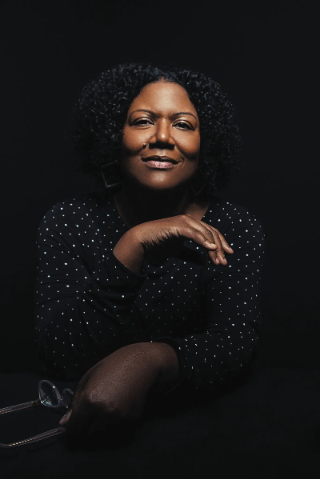-
H. F. Jeffers, "The love Songs of W. E. B. Du Bois책 읽는 즐거움 2024. 3. 18. 11:42
.

Honorée Fanonne Jeffers, "The love Songs of W. E. B. Du Bois" (2021)
미국 시인 Honorée Fanonne Jeffers의 데뷰작이자
The National Book Critics Circle Award for Fiction 2021 수상작인,
거의 800쪽의, 이 소설이 재미도 있었지만, 비소설 Isabel Wilkerson의 "Caste" 에
이어, 아프리칸 아메리칸 작가의 또 하나의 대작을 읽어서 이젠
굳이 이런 내용의 책을 찾지 않게 된 것도 흐뭇했다.
“The Love Songs of W.E.B. Du Bois” is quite simply the best book that I have read in a very, very long time. I will avoid the cliché of calling it “a great American novel.” Maybe the truest thing I could say is that this is an epic tale of adventure that brings to mind characters you never forget: Meg Murry in “A Wrinkle in Time,” Scout in “To Kill a Mockingbird,” Huckleberry Finn. Ailey’s quest is this: How does a young Black woman craft a life that is joyful and whole against the backdrop of the American South, where the land is a minefield of treasures and tragedy? --- 위 서평에서

Honorée Fanonne Jeffers (사진: 위 서평에서)
아래는 이 책에서
[T]he newspapers would report about Ruby Bridges, the little girl who was the first Negro child to integrate an all-white elementary school in New Orleans, Louisiana. One would think that a six-year-old in pigtails wouldn't be so frightening to a bunch of adults.... Yet the segregationists in New Orleans acted as if Ruby was a dangerous animal.... One white woman promised to poison Ruby, and so Ruby's food always had to be carried from home, packed in a brown paper bag by her mother. Another white woman put a chocolate-colored baby doll into a coffin and shook it as the little girl walked along. (p. 260)
"I've got a community meeting, but don't forget to go 'round to my restaurant. Zulu's Fufu. Your money's no good there. Anything you want, just order."
"Thank you, Mr. Harris." (p. 398)
An in time, Andrew Jackson the Indian Killer became the president of his white men's nation. And in 1830, this murderer signed the Indian Removal Act, after which the Creek people's hope turned to the mud after a heavy rain, for this law decreed that all Creek people were ordered to leave homes permanently. Many tried to resist and hide in the forest and in the hills. And many of our people were hunted and killed. (p. 584)
If you get there before I do
Coming for to carry me home
Tell all my people I'm coming too
Coming for to carry me home
Dr. Whitcomb sang along in his passable tenor, completely un embarrassed, as his students exchanged glances. I looked down at my notebook, avoiding anyone's eyes. Just because the man was Black didn't make him my relative. I didn't have to claim him.
"Does anybody know what those lines mean?" After a couple of beats: "Ailey? What do you think?"
The other students turned and looked at me.
Aw, shit.
"Um ... well. I'm not sure, Dr. Whitcomb ... you know ... but I've read that whenever a slave was planning to run, he or she might sing that song to alert the rest of the quarters that an escape was taking place soon/ Those stories might be apocryphal, however."
"Exactly! Wonderful, Ailey!"
(p. 650)
Education is the development of power and ideal. We want our children trained as intelligent human beings should be, and we will fight for all time against any proposal to educate black boys and girls simply as servants and underlings, or simply for the use of other people. They have a right to know, to think, to aspire.
--- W. E. B. Du Bois, "The Niagara Movement Address"
(p. 733)
'책 읽는 즐거움' 카테고리의 다른 글
Kate Atkinson, "Transcription" (0) 2024.03.30 Paul Yoon, "The Hive and the Honey" (0) 2024.03.22 Ann Patchett "This Is the Story of a Happy Marriage (0) 2024.03.05 Karen Armstrong, "The Spiral Staircase" (0) 2024.02.19 Robert B. Reich, "The System" (0) 2024.02.11